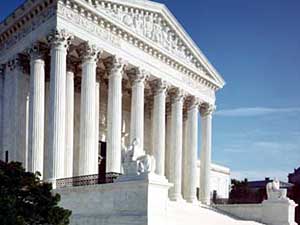|
Audio
Photos
Resources
Your Voice
|
Minnesota ed officials watch affirmative action case closely
April 1, 2003
 |
| The Supreme Court building in Washington, D.C. (Photo courtesy of U.S. Supreme Court) |
St. Paul, MN — The University of Michigan's efforts to increase diversity on its Ann Arbor campus have been under scrutiny since 1997, when three white students sued the university because they were denied admission to the undergraduate and law schools.
They call Michigan's admissions policies blatantly illegal, because the school gives preferential treatment to minority applicants.
The Center for Individual Rights, a public interest law firm in Washington, D.C., is supporting the plaintiffs and their Supreme Court challenge to Michigan's affirmative action policies. Firm spokesman Curt Levey says the Supreme Court's decision in this case could affect college admissions policy nationwide.
"We're fighting for a larger principle here, which is that people should be judged as individuals, rather than based on the color of their skin. And we think that's a principle that applies to all schools, public and private. A broad Supreme Court ruling would emphasize that the law requires that," says Levey.
|
We do use race as a factor in our admissions process. However, we are very moderate in how we use it in the process. It's just one factor among many.
- Wayne Sigler, U of M's admissions director |
The Bush administration has filed a friend of the court brief in support of the plaintiffs.
University of Michigan officials say their affirmative action policy is based on the premise that diversity is an important educational value. It's a value shared by more than 70 educational and business groups that have filed briefs on behalf of the university.
Wayne Sigler, the University of Minnesota's director of undergraduate admissions, says the university supports the value of diversity, because it is critical to enhancing student life and learning on campus.
He says the school does look at race in admissions. He says the U defines diversity broadly, considering economic background, special skills or talents for example.
"We do use race as a factor in our admissions process. However, we are very moderate in how we use it in the process. It's just one factor among many," says Sigler. "It's never the controlling factor, and the university never sacrifices academic qualifications to achieve numeric goals."
Sigler says people of color made up 18.5 percent of the U's fall 2002 undergraduate class. In the law school, officials say 18 percent of the 2002 class are students of color.
The University of Minnesota has not taken an official position on the case, but the U's General Counsel Mark Rotenberg is in Washington to monitor the arguments. He says the decision could have sweeping consequences.
"Affirmative action is a widely practiced technique for achieving diverse student bodies in hundreds of higher education institutions in the United States," says Rotenberg. "But nobody knows whether the Supreme Court will give the plaintiffs everything they want. The court could easily rule against them, and I wouldn't hazard a guess as to how the court will come out."
Officials at the Minnesota State Colleges and Universities system say they're not subject to whatever the Supreme Court decides, because MnSCU admits nearly any academically qualified applicant on a first-come, first-served basis.
The Minnesota Private Colleges Council is taking a position in support of the University of Michigan.
Council President David Laird says affirmative action policies address the increasingly diverse and globally interdependent world we live in. He says institutions have a responsibility to create a diverse environment of learning among peers.
"Who may be somewhat different and who may represent different cultures, different backgrounds, different approaches," says Laird. "And if we're not going to accomplish that in our educational system, where else are we going to provide the fabric of understanding and civility that will help us through the challenges that are clearly in our future?"
The Supreme Court's decision in the University of Michigan case is expected by June.
|
News Headlines
|
Related Subjects
|
